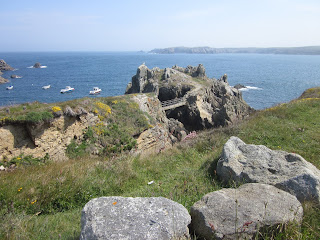Friday, June 28, 2013
Chez Max - Quimper restaurant recommendation
Love, love, love this newish restaurant on the quay near the cathedral in Quimper. Chez Max is in the house once belonging to the family of Max Jacob, poet, artist and visionary who died in the camp at Drancy in 1944. He was born a Jew and arrested as such by the Germans despite his status as an artist of internaitonal standing and a converted Catholic - Picasso stood as his sponsor. The famous drawing of Jacob by Modigliani is etched below the passerelle erected in 1994 over the Odet river in Quimper centre on the 50th anniversary of his tragic death.
The restaurant has a courtyard for outdoor eating, an upper room for groups and a large, welcoming dining room on the ground floor. You can eat à la carte but who needs to with a 13 euro two course lunch that includes a glass of wine. Plentiful main courses and desserts from a choice of two items each. Today I had pork and chorizo sauté served with aubergine two ways, salad, tomato and their gorgeous home-made chips. The iles flottantes dessert managed to be substantial and light as air at the same time, with a sea of creme anglaise to splash about in.
Chef Christophe Getin has an imaginative way with vegetables - unusual over here - yet doesn't mess about too much with the high quality meat and fish. Staff are young and enthusiastic, the tables well-spaced and the period decor unspoilt.
I won't be eating elsewhere in Quimper for a long time to come.
Chez Max - Cour Jacob, 8 rue du Parc
02 29 40 10 20
Sunday, June 23, 2013
The Empress Eugenie's chamber-pot...
It's always amazing what strange stories appear during a forage among the archives of any place, anywhere. This week I've been in Pontivy (once Napoleonville and famous for its imperial town planning), before and after a welcome interlude with friends in Arradon on the Gulf of Morbihan. I'm looking at 19th century politics in this piece, and a very tedious subject this can be, but every so often something ridiculous or amusing turns up to brighten the long hours.
The allure of royal, or imperial, souvenirs is not a new thing. After the brief visit of Emperor Napoleon III and his wife Eugenie to Pontivy in 1858, the 'vase de nuit' (chamber-pot, rather than 'night-jar' which you sometimes see in translations!!) used by the Empress during her night's stay, became a much sought-after item, and not merely for its quality English porcelain. But the very nature of 19th century politics is seismic shifts. Fifty years later, the pot was on sale in a second-hand shop in Vannes.
The Empress was good enough to promise funds for a new church in the town, having been asked pretty bluntly by the priest during the celebratory banquet organised for the imperial couple. How pleased she was to be represented in gargoyle form on the facade, we'll never know. And sometimes it is better not to know things, especially endless detail about the lives of people in whom we have no interest at all.
Monday, June 10, 2013
Qui voit Ouessant voit son sang
Just back from a working holiday on the amazing island of Ouessant. Managed to complete the coastal walk started on a previous trip and highly recommend it: for me it is far the best of all the Breton islands, being harsher and more remote than much vaunted, pretty Belle-Ile. That sense of being far out in the Atlantic (with weather to match - from hot sun to a wind force I've never experienced), and the lengthy, often rough, journey to get there adds to the experience.
Subscribe to:
Comments (Atom)









